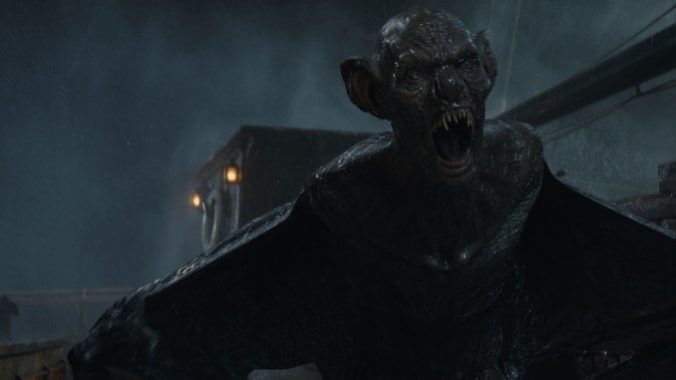The Last Voyage of the Demeter‘s Nautical Dracula Tale Is Defanged

Much like the battered, doomed schooner at the center of its story, The Last Voyage of the Demeter is a film that seemed to be fatally cursed. Writer Bragi Schut (Escape Room) had a script written as far back as the early 2000s and, ever since, plans for production have consistently failed, with the property changing studio hands multiple times as various creative teams would onboard the film before later abandoning it. Directors David Slade and Neil Marshall; stars Ben Kingsley, Noomi Rapace, Viggo Mortensen and Jude Law—all were attached, and all left. After 20 years, it seemed fair to assume the project would be forever lost at sea.
However, just as the curse of the Demeter doesn’t end when it reaches the English shore, torn to bits and with a dead captain and missing crew (don’t worry—the film tells you this upfront), the curse of The Last Voyage of the Demeter hasn’t ended now that it’s landed in cinemas, as it’s fated to be lost within the extensive annals of generic studio monster movies. The unique elevator pitch at the center of this largely misbegotten misfire has had its ambitions swallowed up by tedious, dull anonymity.
That clever central concept is that this is an adaptation of Bram Stoker’s Dracula—but just the seventh chapter, centered around the arrival of the destroyed Demeter which unknowingly transported the central bloodsucker from Transylvania to London, and the accompanying Captain’s log that describes the strange events that led to the crew’s eventual demise. It’s a novel idea, and one that has palpable potential during the initial motions of the film, but one that slowly loses ground to the trappings of standard horror fodder.
It starts with the rounding up of a crew for a special excursion to the British Isles for a mysterious client offering bonus pay for quick and safe passage across the treacherous waters. Captain Eliot (Liam Cunningham) and his mate Wojchek (an always-welcome David Dastmalchain) focus on gathering the roughest mariners they can find, save for one man named Clemens (Corey Hawkins), hired on for his medical and navigational skills. He has a gentler spirit and disposition than the others on board; when the Captain asks his men what they plan to do with their extra cash, Clemens simply says his only desire is to make sense of a world that doesn’t seem to make much sense at all.
Imagine how much his existential anxieties are exacerbated when the crew starts getting picked off one by one in the night by a spindly demon that thirsts for blood. Seeing as the marketing department has not been shy in showing him off, you’ve likely already gotten a sense that this film’s Dracula is expunged of any sense of the humanity that he has in the novel or in other film adaptations. He’s humanoid, but more hellish bat than person, with taut inky skin, empty eyes and an animalistic inclination. This interpretation of Dracula is a full-on creature feature.
-

-

-

-

-

-

-

-

-

-

-

-

-

-

-

-

-

-

-

-

-

-

-

-

-

-

-

-

-

-

-

-

-

-

-

-

-

-

-

-








































